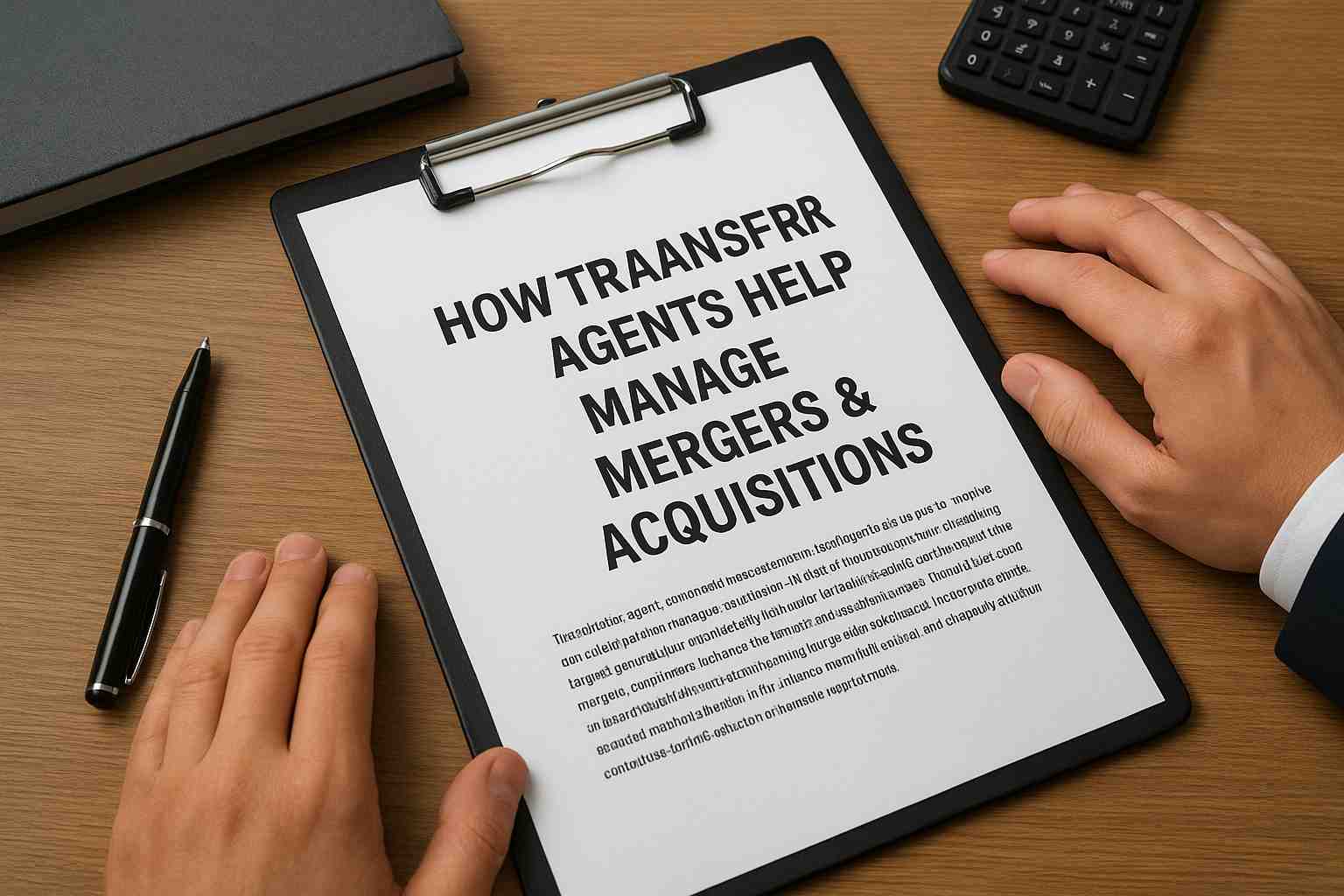Mergers and acquisitions are some of the most complicated business transactions. These high-stakes transactions are challenging because they involve financial negotiations and legal agreements. It also entails managing equity ownership. This is where transfer agents come in.
A transfer agent operates in the background, but it plays a critical role. These professionals handle shareholder records, stock transfers, and regulatory compliance.
What is the Role of a Transfer Agent in a Merger or Acquisition?
A transfer agent is a third-party organization registered with the SEC. These professionals manage a company’s shareholder records.
Their responsibilities include:
- Maintaining accurate shareholder information
- Processing the transfer and issuance of shares
- Handling dividend disbursements
- Supporting proxy voting and shareholder communications
- Managing corporate actions like stock splits or conversions
These responsibilities take on added complexity during a merger or acquisition. They confirm records and process share deals. They also calculate and disburse stock considerations. Transfer agents also manage communication with shareholders. Their role doesn’t end after a merger or acquisition. They will help integrate and update shareholder records.
How Transfer Agents Help Manage Mergers & Acquisitions
A transfer agent acts as the logistics coordinator during mergers and acquisitions. They’re involved early in the process and continue through the final settlement. Here’s how they help manage mergers and acquisitions.
Due Diligence and Record Validation
One of the earliest and most crucial steps in an M&A is due diligence. Both parties will review each other’s financial, legal, and operational status. The selling or merging company must provide an accurate, up-to-date shareholder register.
It’s the transfer agent’s job to make sure that:
- Shareholder records are current and clean
- Restricted shares are accurately recorded
- Outstanding stock certificates are all accounted for
Record validation is critical. Any inconsistencies in ownership data could delay or derail the deal.
Manage Share Conversions and Exchanges
Shareholders might need to exchange old stocks for new ones in an M&A. This will happen at a predetermined ratio. Let’s say Company A acquires Company B. They offer 1.5 shares of Company A for every 1 share of Company B.
The transfer agent manages:
- Cancellation of old certificates or book-entry shares
- Issuing new shares in the acquiring or merged entity
- Notifying shareholders of the terms and procedures
- Facilitating DRS or DWAC stock transfers when applicable
This process is best handled by a professional. It requires precision to ensure shareholders receive what they’re owed. It also guarantees no disruptions in ownership rights.
Disbursing Merger Consideration
Shareholders receive more than new shares in certain mergers and acquisitions. They could also receive cash payments or merger consideration. Transfer agents are responsible for:
- Calculating each shareholder’s merger consideration
- Disbursing cash and/or stock compensation
- Handling fractional shares and rounding payments
- Coordinating wire transfers, checks, or book-entry updates
Communicating with Shareholders
M&A deals need extensive communication with shareholders. Transfer agents help companies by helping with:
- Sending merger notices and instructions
- Providing clear timelines for exchanging shares
- Handling inquiries from confused or concerned shareholders
- Supporting proxy voting, especially in deals requiring shareholder approval
A transfer agent is ideal for this job as they already maintain shareholder records. They’re in the best position to deliver on-time and accurate communications.
Ensuring Regulatory Compliance
Mergers and acquisitions are subject to regulations from various authorities. It’s the job of the transfer agent to help companies:
- Follow reporting obligations
- File required forms related to securities changes
- Maintain documentation for audits or legal reviews
- Issue tax documentation, like 1099s or other statements
Post-Merger Integration
A transfer agent’s job isn’t done even after the company closes the deal. These professionals still help by:
- Consolidating shareholder records into the new entity
- Managing legacy shares from absorbed companies
- Providing ongoing support to shareholders who might have questions about their new equity
- Continue with dividend payments or communications post-merger
An experienced transfer agent is a compliance expert. Their expertise reduces the risk of penalties. It also helps ensure a smooth regulatory process.
In Conclusion
Transfer agents are the unsung heroes of mergers and acquisitions. They ensure shareholders are all accounted for and their securities transferred. They also help maintain compliance throughout the process.
Navigate M&A with Legacy Stock Transfer
Legacy Stock Transfer has been guiding companies through M&A since 1996. We’re a SEC-registered transfer agent with unparalleled expertise in mergers and acquisitions. Our services streamline shareholder record management and securities exchanges. We also offer proxy voting, shareholder forms, and regulatory compliance. We’ll make sure the M&A is seamless. Contact us at info@legacystocktransfer.com or 972-612-4120.

